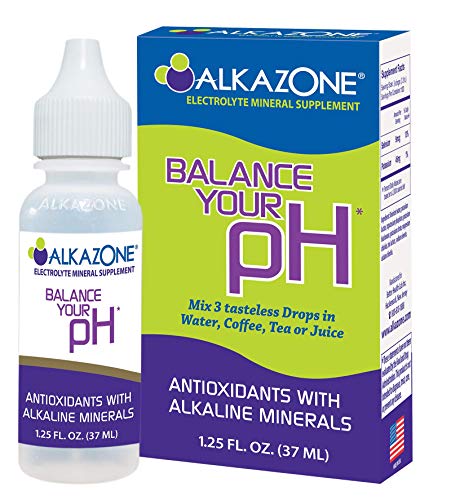Proponents of the alkaline diet claim that eating certain foods influences the body’s acid-base homeostasis, or pH levels. It’s believed that encouraging a healthy, pH balanced environment within the body can produce favorable effects on one’s health.[1] It sounds like a good idea, and it is true that tissues and fluids must maintain a certain pH level to function properly. However, your body has mechanisms to keep pH levels in check — regardless of what you eat. Let’s take a closer look at the alkaline diet and break it down.
Much of the discussion surrounding the alkaline diet focuses on the significant changes in the human diet over the last 10,000 years. Until a recent point on our evolutionary timeline, humans mostly consumed fruit, vegetables, and small amounts of lean protein. Once the food industry came into existence, we began eating more refined grains, fattier sources of meat, and processed foods[2] that are high in sodium, saturated fat, and refined sugars — all of which cause inflammation and contribute to serious, chronic diseases.[3]The alkaline diet discourages such foods.
If you’re researching the alkaline diet, you may have noticed some sources describe it using lofty words like “miraculous.” In reality, there are many variables, diet-related and otherwise, that affect your health. In many ways, the
 Ph. Test Tape Dispense...
Buy New $8.22
(as of 11:25 UTC - Details)
alkaline diet is excellent. It’s balanced and encourages the consumption of raw fruits and vegetables. It’s definitely a healthy plan that may reduce your risk of developing chronic, diet-related diseases. But, does it live up to all the claims?
Ph. Test Tape Dispense...
Buy New $8.22
(as of 11:25 UTC - Details)
alkaline diet is excellent. It’s balanced and encourages the consumption of raw fruits and vegetables. It’s definitely a healthy plan that may reduce your risk of developing chronic, diet-related diseases. But, does it live up to all the claims?
What Is the Alkaline Diet?
Also called the acid-ash diet, the alkaline diet promotes foods alleged to influence acid-base homeostasis in the body. Specifically, whole, raw, organic fruits and vegetables. These foods are thought to produce a “net alkaline effect.” Advocates of the diet say that an alkaline environment within the body helps weight loss efforts, increases energy, and can boost the immune system. However, despite its popularity, the data has not substantiated such claims. In actuality, it’s difficult to say if the alkaline diet has any real effect on the body’s pH balance.
How pH Affects Your Health
Physical Gold & Silver in your IRA. Get the Facts.
To understand how the body’s internal pH levels affect your health, it helps to have an elementary understanding of what pH is. The pH scale runs from 0 (acidic) to 14 (basic or alkaline); 7 is neutral.[4] Pure water has a pH of 7. Sulphuric acid has a pH of almost 0, and is both extremely acidic and highly corrosive. At the opposite end of the scale, lye has a pH of nearly 14. Lye is also highly corrosive, but that’s because it’s extremely alkaline. The acidity or alkalinity of a substance can be balanced with a buffer that resists changes in pH. Alternatively, you can add a substance with a pH on the opposite side of the scale to try and get closer to a pH of 7; i.e. adding a base to an acid, or vice versa.
The human body needs to maintain a pH in a narrow range, between 7.35 and 7.45, to function properly.[5] This pH range provides the ideal working environment for the body’s fluids and tissues. Your stomach is acidic, about
 ALKAZONE Balance Your ...
Buy New $16.90
(as of 10:49 UTC - Details)
3.5 on the pH scale, and it must remain so in order to break down food. Blood is mostly neutral—a characteristic that enables it to transport various substances around the body without affecting or reacting to them.[6]
ALKAZONE Balance Your ...
Buy New $16.90
(as of 10:49 UTC - Details)
3.5 on the pH scale, and it must remain so in order to break down food. Blood is mostly neutral—a characteristic that enables it to transport various substances around the body without affecting or reacting to them.[6]
The wrong pH in a given system or organ can seriously affect your health. For instance, the inside of your stomach is lined with a thick layer of mucus that protects it from being digested along with your lunch. But, the small intestine isn’t as well protected. Instead, alkaline bile is released into the small intestine to buffer and balance the acidity of the gastric acid secreted from the stomach.
Health and the Body’s pH
Clearly, proper pH is critical to your health and an extreme pH imbalance can be fatal. Alkalosis occurs when your blood and other fluids become too alkaline. It’s a condition that can be caused by liver or lung disease, low oxygen levels, or a sudden loss electrolytes. Symptoms include confusion, lightheadedness, twitching and spasming muscles, seizure, tingling in the extremities and face, and respiratory distress.[7]
Conversely, acidosis is characterized by a high acid load in the body’s fluids. There are several different types of acidosis: metabolic, respiratory, lactic, and renal (kidneys). Symptoms include confusion, fatigue, shortness of breath, and lethargy. Metabolic acidosis is the one you usually hear about with regard to the alkaline diet, but there are other causes of the disorder, such as kidney disease and dehydration.[8]
Diet-induced metabolic acidosis results when too many animal products, and not enough fruits and vegetables, are consumed. Metabolic acidosis increases your risk of developing cardiovascular disease, diabetes, insulin
 Alkaline Body Balance ...
Buy New $4.99 ($4.99 / Count)
(as of 11:50 UTC - Details)
resistance, and kidney stones. It causes kidney damage, which contributes to metabolic acidosis.[9]
Alkaline Body Balance ...
Buy New $4.99 ($4.99 / Count)
(as of 11:50 UTC - Details)
resistance, and kidney stones. It causes kidney damage, which contributes to metabolic acidosis.[9]
How Your Body Compensates for Unbalanced pH Levels
The kidneys are one of the body’s primary defenses against acidosis. They accomplish this by sending excess metabolically-produced acids to your bladder to be eliminated via urine. They also maintain tight control over bicarbonate, which can act as either a base or an acid depending on what it reacts with. When kidney function is compromised the body is less equipped to control its acid load, which leads to an even higher acid load. This condition may worsen with age if kidney function continually decreases.[10]
The ability of the kidneys to filter acid is not the body’s only mechanism to control its acid load; the lungs assist as well. Carbon dioxide is a product of cellular metabolism and it becomes acidic in the blood. The lungs are able to increase or reduce respiratory function to maintain acid-base homeostasis.[11]




